#he also vividly hallucinates and it’s just an aspect of his character
Text
in hindsight Buck Vernon is such a funny character. like his whole story starts off with his ass getting dumped but not even realizing it. he goes across the country searching for her and doesn't have any luck until he goes to a random fortune teller (who later admits to scamming him) and takes her vague bullshit to heart which leads him to get caught in the middle of a wild drug ring and he may have accidentally set off a war between said drug dealers and a gang of arsonists that was founded by an undead biker dude. he once bumped into said undead biker dude at a night club while running from the cops. he can see/talk to ghosts and it's never explained why and he doesnt even make a big deal of it. he ends up finding a corpse in the middle of the road and goes "well shit someone has to bury the guy". when said corpse gets up and asks for a smoke buck just. gives it to him and starts having a chat with him. he cant lie for shit and gets caught like every single time but still manages to get out of every situation alive. he once beat up a drug dealer in the back of an arcade. he got black brained which kills every other character it happened to and just. didnt die somehow?? he's killed at least two people and doesn't even blink. when he found his ex and got dumped a second time he just. got up and walked off with a bullet wound in his leg. he presumably lived and proceeds to write weird sad love songs for the rest of his life.
hes the most pathetic noir protagonist ive ever seen. there's something deeply wrong with him. i want to study him
#Edit: I FORGOT ABOUT THE CANON HALLUCINATIONS#he also vividly hallucinates and it’s just an aspect of his character#the ghosts aren’t hallucinations because they know things buck has no way of knowing so he canonly can see ghosts#hes so funny who lets him be like this#whats wrong with him#buck seeing a corpse get up and start walking around: damn this would make a good song#ok but seriously though why can he talk to ghosts#like he can just do that. why#I might be wrong about the first part but honestly vide noir is way funnier if he has no clue. like lee left him but didnt tell him shit#imagine going through all this shit for someone only to found out they weren't missing they just ghosted you#its so funny#also how did he even survive getting black brained. like yeah yeah cosmic ash can bring you back from an overdose but#buck didnt have that. he just?? decided not to die???#at this point god wont let him die#vide noir#vide noir movie#buck vernon#dani speaks#lord huron
89 notes
·
View notes
Text
Shigaraki Distortion Dissocation

In My Hero Academia chapters are titled with “The Origin” or “Origin” when they signifiy both a change in that character’s motivations and also detail where those motivations came from. Most major characters so far have had one origin chapter, Shigaraki has had three and a distortion chapter. Shigaraki Tomura and Shimura Tenko have two different origin chapters, as if they are two different people.
This distortion that Tenko experiences has a real life medical term. It’s called “Dissociation.” It’s a sense of disconnect from the world around you, and even from yourself. More on how Shigaraki shows symptoms of Dissociation under the cut, especially in terms of how he handles his identity.
1. Shigaraki Tomura Distortion
Shigaraki is primarily characterized by the sense of disconnect he feels from the world around him. We see these traits manifest in several ways. One, he almost always uses game terminology when talking about real life problems in front of him. Viewing everything through the lens of a game allows him to distance himself one layer away further from reality.

It’s important to remember that Shigaraki’s world has consisted of the one room that All for One gave him for most of his life. That’s not to say that Shigaraki is not capable of leaving his room, or engaging in the outside world, he’s smart enough to fake it if he needs to.
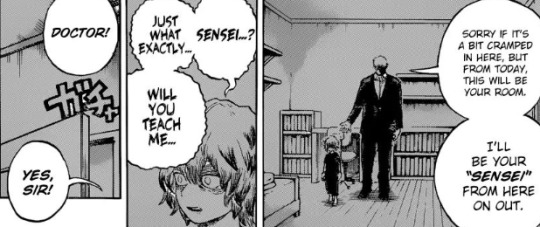
However, he clearly was raised right under All for One’s thumb. Most of his interactions outside the world of his room were violent, ie getting attacked by random delinquints. When a child leaves their house to go to school for the day, when they play with friends, when they talk to other adults they are engaging in the outside world.
It’s clear Shigaraki’s main way of connecting with the world outside of his room has either been through the newspaper clippings and news of heroes he studies laboriously over, or the video games he picked up as a hobby. Video games are a form of escapism and really the only thing Shigaraki had outside of that room. His world has been so insular for so long, that the outside world might as well not exist. Therefore, Shigaraki feels that disconnect, therefore he can treat it just like the fictional world of a video game.
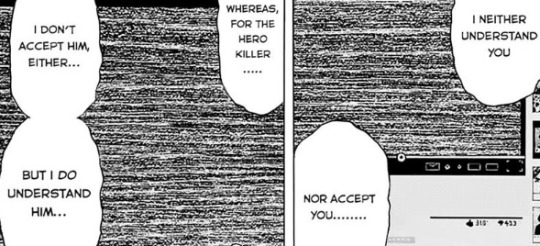
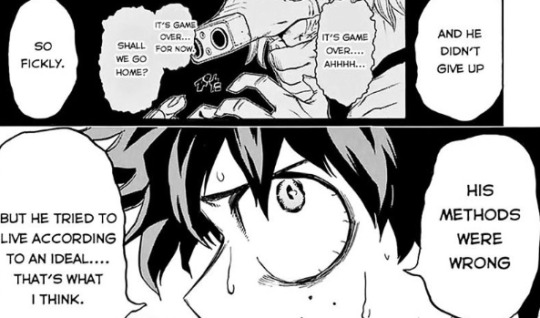
This is something Deku comments on exactly, and even brings up his method of using gamespeak of an example: That people cannot relate to or understand Shigaraki in any way. They cannot accept any part of him. That is how distant Shigaraki is from other people.
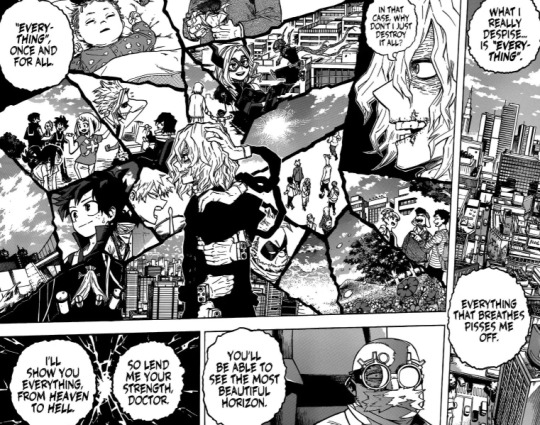
Shigaraki cannot feel anything from the world around him. He cannot engage with it in any way. All of these aspects of daily life that everyone else has, just reminds him how much of an outsider he is. His dissocioation is so strong that he feels there’s literally no place for him anywhere in the world.
Dissociation is a break in how the mind handles information. It’s a disconnect from thoughts, feelings, memories, surrounding, and it blurs the boundary lines of identity and pereption. This “distortion”, this break in identity that made Shimura Tenko into Shigaraki Tomura is clear dissoiation.
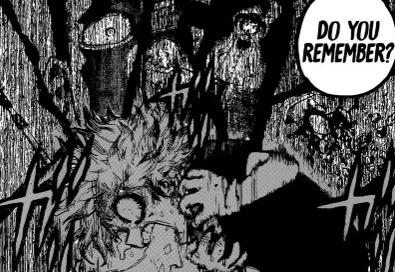
Shimura Tenko and Shigaraki Tomura have two different names. For awhile Shigaraki did not have any of Shimura’s memories, and acted vastly different from Tenko. While I would not say that Shigaraki has full blown Dissociative Identity disorder (often people don’t fall into neat little diagnosis categories). He shows several symptoms in common with it. Dissociative Identity Disorder develops in cases involving severe abuse at a young age. He may not have DID but he clearly is somewhere vaguely in the group known as Dissociation Disorders which can include Dissociative Amnesia, Dissociative Identity Disorder, and Depersonalization Disorder.
It develops often as a coping mechanism that a person uses to disconnect from a stressful or traumatic situation, or to separate traumatic memories from normal awareness. It was a break in a connection with the outside world, to create disatance and awareness of what is occuring. This is a way of coping, dissociating extremely painful memories from everyday thought processes is used so the person could continue to function.
Shigaraki Tomura has a different name from Shimura Tenko. He has vastly differeng goals, Shimura Tenko wanted to be a hero, Shigaraki Tomura lives to destroy heroes. Their personalities are also different, you could even say that Shigaraki developed a violent streak to compensate for Shimura Tenko who could only cry and do nothing as he was abused. While Shigaraki Tomura may not be a full blown altar, he at least has several elements in common with one. (Note most alters are not violent, in real life people with mental illness are more likely to be the victim of violence).
Shigaraki clearly suffers from a dissociative disorder. His main method of coping, that is continuing to function has been to sever away his incredibly violent memories of the past and his own feelings from himself. Shigaraki Tomura may not be an alter to Shimura Tenko, but it’s clear from the violent way his body reacts to his own traumatic memories, almost as if rejecting him, that Shimura Tenko had to become Shigaraki Tomura in order to continue on living. We literally see depcitions of his mind framgenting and breaking in the art itself.


That’s what dissocation is. His mind is not breaking because he’s twisted, or insane. His mind is fragmenting to try to keep him functioning, because a five year old literally just cannot process the stress of having been abused, and then killing his entire family.
2. Shigaraki Tomura Origin
So therefore we see, Shigaraki Tomura was created by Shimura Tenko’s dissociation. They may not be two different people, but the person Shigaraki is now is the result of him always having to distance himself from his own traumatic memories since he was five years old.

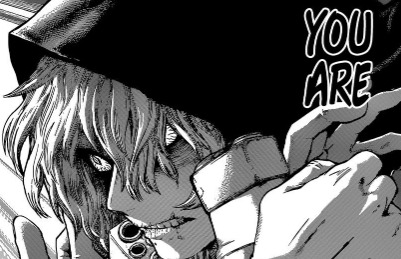
Dissociation is an adaptive response to a threat, and it is a form of “freezing.” (x). It is a strategy used when running is not an option. People shut down or retreat inside of themselves. It’s a normal trauma response, however it becomes a problem when it is the only method of coping. Shigaraki has been dissociating since he was five years old, and he is in a way frozen.

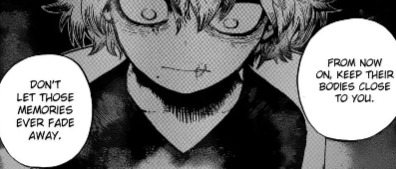
He’s literally never allowed himself to heal all this time. So, the feelings from his wounds when he was five years old remain even now. He’s trying to live while constantly carrying around those hurt feelings that he has no idea how to process inside of him, and because of that his literal only way to remain even remotely functional is to constantly distance himself from his own feelings.
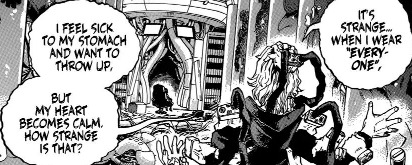
What Shigaraki is describing is Dissociation. He feels everything at once, and then nothing, because when Shigaraki re-exposes himself to his trauma over and over again he literally has no idea how to process those feelings so he just doens’t feel them. All of the symptoms that Shigaraki displays have connections to symptoms of Dissociation.
Memory loss (amnesia) of certain time periods, events, people and personal information. [x]
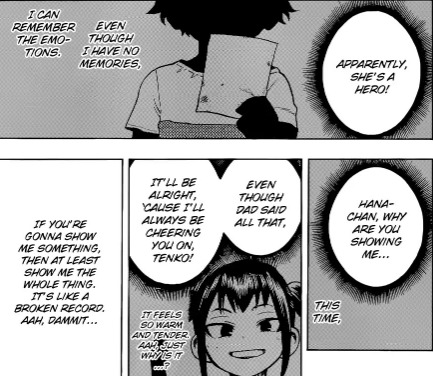
Shigaraki experiences memory loss, and notice the blurry person in his memory is not his sister. The person he is forgetting is himself. Because Shigaraki in trying to escape the guilt of what he did to his family, is continually destroying his own identity. He distances himself from who he was in the past, and thus Tenko in the flashback is just a black silhouette. He is not there, even in his own memories, those memories do not belong to him.
Shigaraki also shows stress induced flashbacks, several times. Including in this fight against the league, when he’s talking with Midoriya, his dissociation allows his perception of time and his own memories to blur around him.
A perception of the people and things around you as distorted and unreal
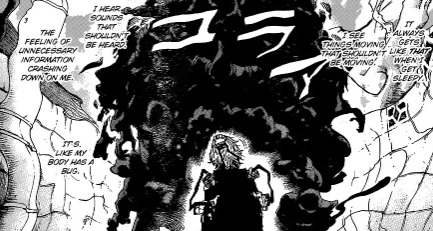
Shigaraki perceives the events around him as if preceeding in a game. He vividly hallucinates these distortions in reality, and when he becomes stressed (lack of sleep, fighting constantly for a month) his perception gets worse and worse.
Significant stress or problems in your relationships, work or other important areas of your life. Inability to cope well with emotional or professional stress
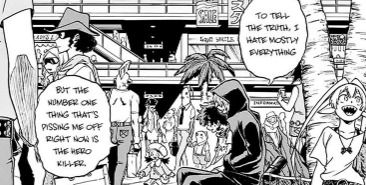
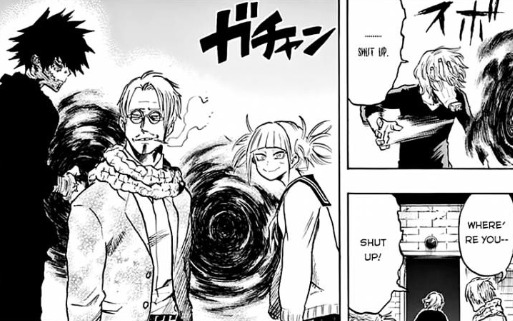
Shigaraki is always in extreme stress. He’s constantly exposing his body to stress, and has almost nowhere to vent those feelings which is why he turns to random destruction. In the past when Shigaraki was still isolated, he even took it out on the people who were supposed to be his comrades and it was almost impossible for him to form close relationships with them, he literally tried to kill Dabi and HImiko on sight for annoying him, and then he threw a tantrum and stormed out when Kurogiri would not let him.
Shigaraki just does not have a strong sense of connection with himself, or his own emotions. His emotions and trauma are so strong it’s almost impossible for him to feel it in any way, he would break into pieces, so he’s been dissociating all this time. He’s like a sieve that has to let all of the sand bits fall out, otherwise he would overflow.
The number one criticism that every villain, Rikiya, Stain, Chisaki and even Midoriya has for Shigaraki is that he has no sense of self. He has been told this over and over again, that he’s empty, that he’s insane, that he has no reason for doing what he’s doing.
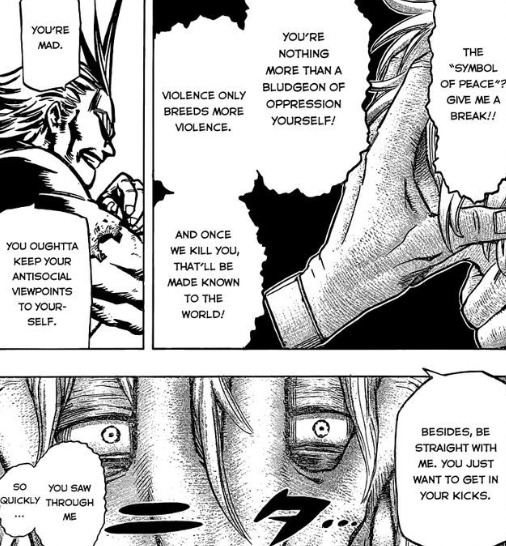
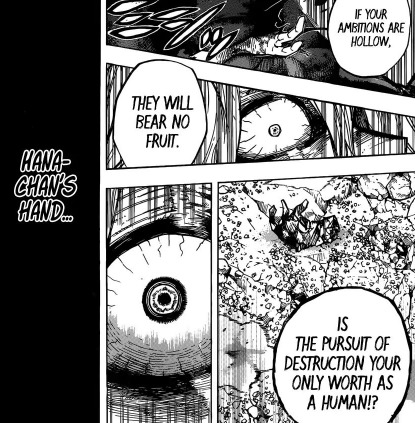
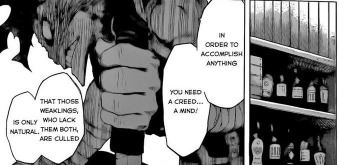
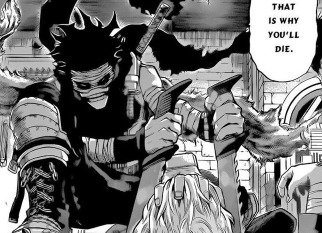
Shigaraki has not developed fully as a person. Due to his dissocation, he cannot be his own person with his own thoughts and feelings. He cannot handle that the same way everybody else can. However, at the same time the world has never allowed Shigaraki to be his own person. Ever since he was young he’s been denied over and over again who he is by other people. Shimura Tenko is denied. Shigaraki Tomura is told he’s worthless, he has no motivation, he has no feelings and nothing he will do will amount to anything.
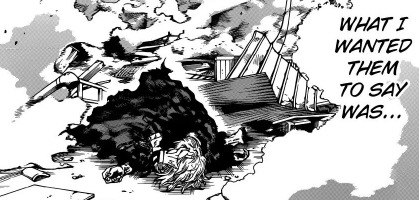
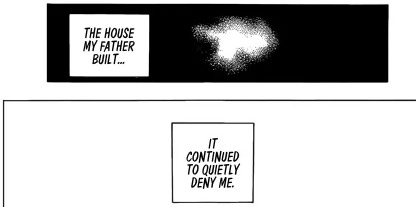
The entire world is denying him as a person now, the same way his father’s house did. The world will never let Shigaraki Tomura be a person. So, it’s no wonder that he wants to destroy it.
#mha meta#shigaraki tomura meta#league of villains meta#league of villains#shigaraki tomura#shimura tenko#my hero academia#my hero academia analysis#my hero academia theory#meta
514 notes
·
View notes
Text
paradise island: a review
A note before we begin: everything above the cut will be spoiler free and will just be my general feelings about the story as a whole, the writing, and if I’d recommend it. Everything below the cut will include spoilers to explain my feelings about the story.

Rating: 3/5 stars
Visiting the North Shore had been a bizarre and unsettling experience, to say the least, but when they got home after vacation was over, he was going to suggest to Colby that they make a video about it.
Hell, no. Even better. Write a book. Videos melted away after a while, but a book? Books and stories solidified on the conscious mind forever. (91-92)
Overall, I enjoyed this book. I generally enjoy stories like this, but there were a few moments throughout the novel where things just fell a bit flat.
While I was reading, I made a few notes, the first being that there was a weird juxtaposition between talking about more adult topics (drinking, women, sex, etc.) but in an odd, almost kid-friendly way. Some of the word choices were interesting, such as constant use of “fancy-pants”, “hottie”, “goofball”, “oddball”, and “doofus”, as well as the one moment where Colby said he hated “dicky” people and the moment where Sam said Colby was about to have an “emo-ruption”. (Though I did laugh a lot longer than I should have at “emo-ruption”.) It felt like they were still trying to make the story appropriate for their younger fans by using more kid-friendly language, while also appealing to their older fans by being like “look!! we drink!! and ooh look, we talked about smoking weed 👀🤪”. I wish they would’ve committed to one or the other, because it added an odd sense of disjointedness to the story that could’ve been easily resolved.
The other big thing I made note of was that there was a lot of “tell, not show” throughout. There’s a heavy focus on dialogue to progress the story rather than seeing into the boys’ inner thoughts and using other means to find out information. (I’m not one to talk, though, since I also focus more on dialogue than description.) It sometimes made it difficult to fully get into the story. I struggled with developing a picture of what the Belle Estate looked like, or what the other characters (beside SNC, Nate, and Alex) looked like. In terms of the boys, it seemed very reliant on us knowing who Sam and Colby are and what they’re all about (which is fair, since probably 99.9% of people who bought the book are fans of them but, if they want success outside of their audience, it could’ve been more descriptive in that regard).
As for the big twist at the end, it was a bit lackluster. I’ll go more in detail on this in the “spoiler section”, but it kind of diminished everything that had happened throughout the story and left me wondering “what was the point?”.
I was excited when I’d heard that the story was told through both Sam and Colby’s POVs, but, I’ll be honest, I saw little difference between Sam’s chapters than Colby’s chapters. The most difference was the almost stereotypical portrayal of Sam being the logical one while Colby being the emotional one. Aside from that, they were almost indistinguishable from me and I often had to flip back to the start of a chapter to remind myself of who’s head I was in.
Since that was all critical, here’s some things I did like:
I feel like, while the inner monologues were a bit lacking, Gaby did make up for it by making the dialogue between the boys really realistic to them. In this regard, she really nailed the portrayal of them.
The depiction of the paranormal things was really great. I feel like those parts were the ones I could get most into the story. The way Gaby wrote them was so interesting and pulled me in. I wish there was more of these moments throughout the story, because I think they really showcased who Gaby is as a writer.
The convo where Colby called Sam “Velma” and then Nate asked if Colby was “Fred”? I really enjoyed that because (a) Scooby is my favorite thing in the whole world and (b) I chose Sam and Colby be Velma and Fred in my moodboards a month ago so just a lil fun moment for me.
Just how meta the book was. Like, the quote I included at the top? I laughed for way too long when I read that.
There was a nice sense of nostalgia throughout, specifically when they brought up their YouTube channel, their Vine days, them being arrested, wining a Teen Choice Award, and Corey and the Shadowman. It made me feel all warm and fuzzy inside, and reminded me of how proud I am for how far they’ve come.
*slight spoiler here* Speaking of being arrested, there was a moment where SNC were contemplating escaping to the beach and they had a conversation if it was worth being arrested again. I really loved that, especially with how much fans joke about them inevitably being arrested again.
This is more for the person who designed the cover, but holy shit?? I loved it so much??
I don’t know if I would have picked this book up if it didn’t have Sam and Colby’s name attached to it. I will say, though, I finished the book in one sitting, which is pretty rare for me nowadays, so it was engaging. I think, overall, it was a great story with a great concept but it could’ve been fleshed out more. In some ways, it almost felt like this was a draft rather than a completed novel.
That being said, for SNC’s first book and Gaby’s first time working with the boys, it exceeded my expectations. If they were to continue writing books together, I imagine it will get better and better as they get more used to each other and potentially open up more so that their characters become a more accurate depiction of them.
Overall, the book’s not something you really need to race out to get. I think, if you have a gift card or there’s some sort of deal or you need to spend a little more to get free shipping, it wouldn’t hurt to pick up Paradise Island. It wasn’t bad, but it wasn’t a great, top-tier novel in my opinion. That being said, if you do pick it up, I think you will enjoy the book.

Spoiler Avenue
The characterization of all four of the boys is a bit 2D. Sam’s logical and wants to keep the peace, Colby’s emotional and more of a wildcard, Nate’s focused on his schoolwork and flexing his vocabulary, and Alex? Well, I couldn’t get a good read on Alex until he sells out SNC at the end of the novel and even then, he didn’t feel so much like his own character, more like someone just present to further the plot.
Speaking of characters, the introduction of Trey was...meh. I wish we could’ve gotten more insight on why Colby was so adamant about not liking Trey and why Nate was so gung ho to ditch their plans to go to the North side of the island for this guy they barely knew. Finding out that Colby didn’t like Trey because he said college was the only way to success was such an odd thing? Like, undoubtedly there’s been many people who would’ve said that, so does Colby also dislike everyone who’s said that or is there a more specific reason he didn’t like Trey? Just...👏🏻 more 👏🏻 inner 👏🏻 thoughts 👏🏻 please 👏🏻 and 👏🏻 thank 👏🏻 you 👏🏻
@golbrocklovely brought this up in her review but Colby’s fixation on the mermaid statue of a 16-year-old was really odd. It probably wouldn’t have been as odd if Amy was aged up a bit to 18, but as a 16-year-old with the descriptions that were given? Yeah...not the vibe.
I also wasn’t a fan of how so many things plot-wise was just...told to the boys. They could’ve found some newspaper clippings or something, anything to make them put in a little bit of detective work. But for so much information to just be handed to them? It got old, and almost lazy.
The big twist being that all of the paranormal stuff they’d encountered being a hallucination? God, that was so fucking annoying (though I did go back afterwards from the moment that they first arrived at the Belle Estate—starting as early as page 36—and it felt incredibly obvious knowing now that it was all drugs, so props to Gaby for dropping that many hints early on). To spend so much time making all of this scary shit happen just to turn around and say “HAHA JK THE BOYS WERE JUST TRIPPING BALLS” was such a cop out. It would’ve been more terrifying for it all to be real, make the boys question their beliefs and the reality of there being something out there that they didn’t quite understand. Though, there is something terrifying about not knowing you’ve been drugged and having hallucinated that vividly, but I feel like it didn’t quite fit in with the story.
Alex betraying the boys? So interesting! This was one of the few things that made sense in terms of them being drugged. But then when he was betrayed when Pauahi (who’s name was misspelled a few different times in the book) escaped? Ugh, amazing. We love instant karma like that.
Going back to the “tell not show” thing, I wish the sacrifice at the end would’ve been more detailed. For all of the paranormal stuff to be written off as a drug-induced hallucination, I would’ve loved if Gaby had leaned more into the horror of being used in a human sacrifice. There was more of a focus on Colby bargaining for his life, which is fair, but I would’ve loved to see more of the pure terror there.
That being said, the way Trey finally snapped out of it? *chef’s kiss* Loved that shit so much. And I loved the fact that Trey stayed behind in the end. It added a nice eeriness to the story that had been lacking since they debunked the paranormal shit as being hallucinations.
Again, going back to my overall, thoughts, I enjoyed the book in general. Some things could’ve been fleshed out a bit more to reach its full potential. I wish they leaned more into the paranormal aspect and had more descriptions to balance out all of the dialogue, but other than that, I did enjoy the book and don’t regret buying it.
9 notes
·
View notes
Text
The Twin Peaks Guide to the Occult [3]
The Summoning of Spirits
Summoning is such a quintessential part of magick practice. This has been the case historically as well as currently. What is summoning? It is a particularly involved way of communicating with the self, and of picking and choosing aspects of our memory and personality that we then give animation to. We create a spirit within ourselves with these dimensions. The mind is incredible - particularly in its ability to model and to imagine. We are limited only by the boundaries of our imagination and memory.
Below is a method to summon entities. It is particularly easy to give animation to elements of our memory that we have a defined stereotype of. The characters of a show, people we know in person and have a long relationship with - drawing on our internal stereotypes of people we have a strong “sense” of is one of the easiest ways to develop an animate point of consciousness within our mind’s eye that can be talked to and influence our behavior in a way that feels abstracted from our main sense of self.
This can be used for many things. Gaining perspective. Modeling character interactions in a work of art - imagining and then modeling what will happen next in a story you are writing. The abstracted nature of these animate characters we can create in our mind lends themselves to spontaneous psychological effects and moments of inspiration - things that feel somewhat outside of our control. This adds variability to our thoughts. It’s also just a fun practice and it is interesting to play around with the mind and what it can do.
A Consideration of Character
The interactions between the various parties in Twin Peaks in addition to the general social context of the town serves as one of the main points of interest in this show. Twin Peaks presents a compelling and immersive community of characters. Understanding and analyzing their motivations is a good place to learn the general logic behind the idea of entity contact or summoning spirits.
For this summoning ritual, the only materials needed are your imagination and a quiet space. Enter your mental space that you set aside for considerations related to Twin Peaks and, perhaps, your studies of the occult more broadly. Model all of your senses in this space; attempt to immerse yourself as vividly as you can in your internal reality. This is now your entire reality; repeat this idea to yourself as you disavow information offered to you from your circumstances outside of your mind’s eye. Let go of daily life concerns, unpleasant physical sensations, and so on. All there is, is the internal world.
There are two main divisions in types of spirit work. Perceiving the other consciousness outside of yourself (evocation or summoning), and perceiving yourself as becoming this new consciousness (invocation or possession).
A third type involves hallucinating the other consciousness. A study of imposition (learning to consciously create hallucinations), which is outside of the scope of this post, can be used to provoke this third type. It is similar to the other two types but with a slightly different focus. A fourth type involves altered states such as dreams or the use of entheogens. A fifth type uses a ritual or other external cue. These latter three types are all different ways to obtain one of the former two types of entity experiences.
It is furthermore possible to integrate or transform the resulting abstracted consciousness into the self to change the self in the direction of that integrated consciousness. By being forced into direct contact with the consciousness as it integrates, the main self decides its own answer to the internal conflicts encountered by that consciousness.
External places and ideas have a type of consciousness to them, although it is experienced slightly different by the magick practitioner. This is likely due to the way the mind remembers information. It remembers information along certain axes. We have a division in our place vs. our person memory and the way we handle perception related to these two things.
Some people find it easier to shapeshift into a new consciousness. Other people find it easier to animate a consciousness that feels separate from themselves. Repeated attempts to access and animate the same concept/character increase the elaboration and complexity of the resulting spirit/animated and abstracted aspect of the self.
While in your internal space, visualize the character you wish to model. Imagine their appearance, their mannerisms. From there, it becomes a matter of modeling their mind. Focus on your internal stereotype of that person, focus on your sense of that other person, your feeling when you think of that person.
Route 1:
Draw your sense of that person into yourself. You become that person. Everything you do is checked between your logic vs. that other person’s. Everything in this trance state is done in the shape of that other person. All of your thoughts are this other person. After 10-15 minutes, more or less if you want, you can stop.
Route 2:
Imagine that other person separate from you, either in your mind’s eye or outside of yourself in your physical location. Have a conversation with that person. Model what they would say. After 10-15 minutes, stop for the day. At first, it will feel awkward and as though you are talking to yourself via a puppet, but after enough times it will become more natural and automatic, and you may find yourself slipping into that alternate perspective or hearing its internal logic comment on what you do throughout the day. Don’t forget to regularly remind yourself of the division between yourself and this part of your memory/personality/perception.
If you want to reintegrate with this abstracted sense of self, reverse the process. Take the feeling of that self and integrate it with your main sense of self. Visualize a picture, something symbolic, maybe of colors mixing to become a new color. Blue and red becoming purple. Keep reminding yourself that the only voice you hear inside your head is yours, and this is your thought process. It will quickly integrate into your main sense of self.
Don’t forget to come up with a cue that signals the beginning of a summoning/possession session and a cue that signals the end of it. Clean compartmentalization of behaviors and mental states is essential for a particularly vivid psychological experience.
Bob, Leland, and Mr. Robertson
Leland is one of the most compelling characters of the show. We see aspects of his psychology expressed indirectly in the events of the show. Leland, as Bob, is a character that affected the lives of not only his daughter, but of his co-workers and the people he engaged in criminal activity with. The various moves he makes to cover his second life are found peppered throughout the show; 25 years after the events of his daughter’s death and his subsequent suicide, his attempts to cover-up Bob are still being discovered - like with his attempt to hide his daughter’s journal entries in the police station that is only discovered in the third season.
Leland is one of the most interesting characters from this show to model, least of which being the wealth of information the show contains on his character. Leland is implied to have been a user of cocaine, and that fire was his metaphor for the high of cocaine. “Fire, walk with me.” Leland’s relationship with Mr. Robertson from his childhood is left mostly in the shadows; was it a sexual relationship? Did he witness Mr. Robertson kill someone? In either case, the psychological impact of Mr. Robertson on Leland’s childhood changed him as a person, leading to his possession by Bob in the show. It is a wonderful metaphor for the process of introjection itself, and how traumatic experiences and individuals can seem to haunt us for the rest of our lives. Not only did Leland find himself personally haunted by his experience with Mr. Robertson, but the way it affected Leland as a father to Laura affected her as well. Bob is a terrific metaphor for the psychological affects of these cycles of inherited trauma.
The Duality of Leland Palmer and Laura Palmer
Laura and Leland were similar and opposites in many interesting ways. There is an important contrast between the two that is worth considering. Laura and Leland both had difficult upbringings; Leland’s implied traumatic past and the implied trauma Laura witnessed from living in Leland’s household with its particular demands (his involvement in organized crime and drugs, and so on.) At the same time, it’s heavily implied that this makes them similar in some ways. Leland has a difficult time controlling his behavior, up to the point that Ben Horne calls for his murder (it is implied that Bob’s possession of Leland and his subsequent suicide may have been a metaphor for the psychological effects of Leland dodging Bob Horne’s hit) because he’s attracting too much attention. Leland was a man who could call a hit or kill a prostitute for fun, and it was implied he regularly practiced both things. Laura was not this sort of person at all and wanted to bring him down after discovering these things, making them opposites in a sense; however, this was Laura’s own approach to death, and it could be said this was how Bob manifested in Laura. Death by prison isn’t much better than death by hitman.
#witchcraft#witch#occult#twin peaks#pop culture magick#evocation#invocation#spirits#spirit work#fictives#otherkin#summoning#possession#mediums#mediumship#hedgewitch
8 notes
·
View notes
Text
I Like This Show A Normal Amount: Will Graham As Autistic Representation
In a previous meta post about Will, I briefly alluded to my appreciation for Will as good autistic representation, and for Free-For-All Friday, @tin-can-paladin prompted me to do as I’d said I might and write a Thing about that. (Hopefully today is the day I actually get this post finished and up!) So here we go.
First of all, this post will be starting from the premise that Will is an autistic character. I don’t particularly care if Hugh’s said he’s not; whether or not he meant to, he and Bryan gave us an autistic-coded character and I reserve the right to be delighted about it! (Actually, that’s not quite true - I do care, in the sense that I wish he hadn’t said that, because acknowledging portrayals of characters on the spectrum that aren’t a walking fucking stereotype played for lulz *cough BBT COUGH* or as a tragedy inflicted upon their neurotypical family members as being on the spectrum is Important. But whatever.)
This post will address aspects of Will as a character, but also to an extent how he’s handled in the wider context of the show, and why that matters.
Agency
This was my primary focus on that previous Will meta post, but in context of autistic representation, I think it’s an important thing to highlight in this post as well: Will Graham is a whole-ass adult in control of his actions even when other characters don’t think so (see: Alana, Jack, et al in late season 1) or are actively trying to subvert that (see: Hannibal, You Asshole).
Autistic characters in various media are all-too-frequently infantilized and handled as though their environment/circumstances completely dictate their behavior. Will both implicitly and explicitly (“You can’t reduce me to a set of influences” - ironically for a later part of this post, the next thing he says mentions behaviorism), resoundingly rejects this, and I love that as part of his narrative in general but also as an autistic character in particular.
Empathy
This one’s gonna be a doozy. There’s a lot to talk about here that all generally falls under the heading of “autism and empathy,” so I’ll do my best to stay organized.
First, the simplest: He cares! So! Deeply! And complexly! And we know that throughout the show!
Frankly, this in particular massively exacerbates my irritated wish that the creators would explicitly acknowledge him as autistic because holy shit the stereotypes he combats with this. Autistic people in the real world have widely varied, diverse relationships with empathy and compassion (which are different things, and I have some beefs with the way the show uses the word “empathy,” but that’s a digression and this is already going to be a long post), but media largely erases this, conflating difficulties with normative, neurotypical-passing social behavior with inability to empathize, and/or display compassion, and/or even feel emotions (FFS).
There’s a related point about “normative-passing social behavior” that I want to expand on a bit, here: we see a lot of profound differences in demeanor for Will over the course of the show, and that’s something I’ve seen interpreted as manipulation sometimes when it really isn’t. (Not to say Will is not manipulative/capable of being manipulative, because he is, very! But not everything calculated is necessarily manipulative, and I see the two conflated a lot and that annoys me.) Will has, to my eyes, four basic social “modes.”
I’m Dealing With Most People With Whom I Have No Particular Antipathy Or Affection - Aloof, and either standoffish or polite depending on how his boundaries are being treated. He’s not particularly interested in making people comfortable when they’re making him uncomfortable (and being a white dude generally enables him to take this attitude without big repercussions), and people frequently make him uncomfortable.
I’m Dealing With Someone I Perceive As Vulnerable - Exaggeratedly calm, kind, careful. He’s trying to connect and provide comfort and support. He’s minding his every move and word because he doesn’t want to cause harm incidentally. (Abigail, Peter, Walter, etc. and to some extent, Margot, though with her it’s mixed with other attitudes.)
I’m Dealing With An Enemy - This is where the manipulativeness (and even, particularly in the cases of Bedelia and Hannibal, cruelty) comes in. He’s minding his every move and word because he wants to elicit a specific response from the person he’s interacting with. (This comes into play with Jack and Alana at various points even though they are rarely full enemies.)
I’m Dealing With A Trusted Friend - Has neither the deliberation of 2-3 nor quite the standoffishness of 1. He’s neither projecting an image appropriate to a specific kind of fraught social situation, nor actively trying to deflect attention and interaction. In my opinion we really only see this with Hannibal (in season 1 and then with flashes of it in 2 and 3) and Molly, though he gets close in a handful of moments with Alana, Beverly, and Jack.
All these modes deal with a) to what extent he is acting, and b) why he’s acting. And I love that we get to see this breadth of social interaction modes from him, because that is an accurate and sensitive portrayal of an autistic adult, reflecting the often-dramatic differences in “difficulty setting” of an interaction - how and to what extent are we expected to (or otherwise have a need to) mimic neurotypical mannerisms? What are the stakes of the situation? These are explicit considerations for a lot of autistic people, and Will demonstrates that vividly throughout the series.
Another way in which empathy and social interaction come into play in terms of autistic representation is that Will can and does form strong social bonds - not very often, because the way most other adults treat him isn’t conducive to it, but with people who display acceptance/a lack of judgment for his non-neurotypical reactions and behaviors, and importantly, who don’t treat him as Other for the way he can reconstruct crime scenes, we see that can form very strong bonds. Hannibal is obviously the prime example of this, but also Molly, and to a much lesser extent, Alana and Margot. (Though Jack refers to him as a friend and they have some friendly interactions, their bond is not a strong one and not at all marked by the kind of humanizing acceptance it takes to get truly close to Will.) People who accept who he is, and who are neither threatened by his skills nor dependent on them.
Finally, in this section, let’s look at the crime scene reconstructions and “getting inside killers’ heads” bit.
I have complex feelings about this aspect of the show, or more precisely, how other characters talk about his reconstructions and serial killer profiling - they (even Hannibal, to an extent) talk about it in mystifying terms, and I thoroughly dislike the term “empathy disorder” that gets thrown around so much in seasons 1-2 to explain what he does. Will is apt to testily correct people that he just interprets the evidence, and that is exactly what he is doing. His vivid imagination coupled with years of active study of criminal psychology allow him to take that interpretation a lot farther than anyone else would, and sometimes make intuitive leaps that the other characters can’t follow. But it’s clear that this intuition is founded in concrete evidence, as we frequently see him stymied when he doesn’t quite have enough of it, much to the frustration of Jack, who is particularly shitty about treating him like an oracle.
I like that Will gets to stick up for himself and correct people on several occasions, but I wish the ableism and the Othering was less pervasive amongst the other characters because it makes me want to slap them. I find that I really appreciate how most of the fic I’ve read since entering the fandom thoroughly and often explicitly rejects the pseudo-magical divination and/or Crazy Person With Magic Brain angle.
Perspective
There was something I was reaching at that was eluding me in my first attempt at this draft, and then I ran into an excellent article about writing autistic characters that suddenly and thoroughly solidified it for me. It’s really brilliant; it discusses and illustrates the strong difference between a behavioristic (see previous reference) approach to characterization and a humanizing one. Behavioristic analyses divorce themselves from the actual mindset and experience of the subject, whereas humanizing portrayals display the subjective experience of the person who is perhaps behaving in a way other people may find confusing.
Since Will is the main point of view character in the show, we get front-row seats to his subjective experience and can therefore more properly empathize with him. An abnormal reaction to an abnormal situation is normal behavior. The behavior that Jack and various other characters are exasperated, impatient, and/or unnerved over all looks pretty reasonable when we know how Will is experiencing the crime scene, or are seeing his nightmares and hallucinations along with him! And while the nightmares and hallucinations in season 1 are a matter of encephalitis and trauma rather than neurotype, it still matters that we’re led to understand something of what he goes through, from his own perspective rather than an outside one.
It’s incredibly necessary emotional context moving forward in the show, giving us an autistic character who is flawed but deeply human and whose darkness we can understand.
#hannibal#will graham#my meta#meta#thanks for the nudge to actually write this#it was difficult enough that it probably wouldn't have happened without said nudge#but i really wANTED to write it so#I Like This Show A Normal Amount
131 notes
·
View notes
Photo
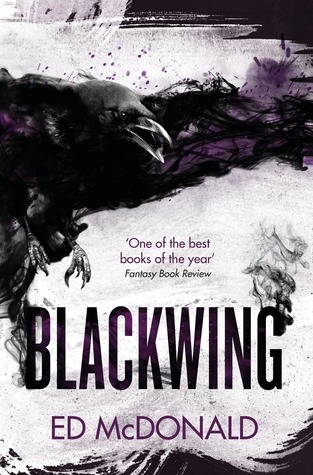
Blackwing - Ed McDonald
While it may be a little bloated at times, which unfortunately weighs the story down in its later sections, overall I have to say Blackwing is a pretty solid debut. Writing vividly and originally, Ed McDonald has managed to pull off something few authors have been able to do in recent years—open my eyes to a new way of doing grimdark.
In this novel we follow our protagonist Ryhalt Galharrow, who is a bounty hunter and captain for the Blackwing, a mysterious organization which serves one of the powerful ancient entities known as the Nameless. His patron, called Crowfoot, is a ruthless master who communicates through a tattoo on Galharrow’s arm, bursting forth from his skin in a form of a raven whenever he has orders to give. In this way, Galharrow receives his latest mission which takes him and his crew into the Misery, an expansive wasteland created when the Nameless unleashed a devastating weapon called the Engine against their enemies the Deep Kings. As a result, corrupted magic runs rampant in the Misery, along with the forces of the Deep Kings still lurking and waiting to strike at unsuspecting victims.
Galharrow now must lead his squad into danger, following Crowfoot’s instructions to track down a wayward noblewoman last known to be holed up in a remote outpost in the Misery. When our protagonist arrives at his destination however, he is surprised to find it under attack by agents of the Deep Kings, which should not have been possible given the protections surrounding the place. Things take an interesting turn when the very woman Galharrow was tasked to find ends up saving him, and it is revealed that the two of them actually know each other from a long time ago. While both characters have changed a lot since those happier days, together they must work through the secrets of their pasts in order to survive the challenges and horrors ahead.
Right away, I was drawn to the strong voice of Galharrow, who commands the reader’s attention with his depth of his experience and force of his personality. He’s a natural leader, easy going and good to the men and women who follow him, but he is also jaded from his long years of being a mercenary and serving a Nameless master like Crowfoot. On the surface, it might not appear as if much separates Galharrow from the usual lineup of grimdark anti-heroes, but to be fair, McDonald does keep a lot of detail about his protagonist close to the vest. Only once the story gets going and the main conflict is revealed do we get a chance to see some of his past seep through.
Without a doubt though, the highlight of Blackwing was the world-building. The setting almost feels like a medley of elements taken from a huge number of genres, which probably explains for the many different ways readers have interpreted the novel’s world despite the rich detail and descriptions. For example, at times I would feel like I was in a high fantasy reading about all the incredible systems of magic, while at others the bleak and barren landscape reminded me more of a post-apocalyptic western. There are a lot of horrific sights and sounds to be found in the Misery too, the corrupted land causing people to relive their worst memories or experience disturbing hallucinations, not to mention the terrible creatures that dwell there. Everything feels so original and fresh in this book, than even the most grotesque and disgusting aspects of the world-building left me in awe of the author’s imagination.
But of course, like many debuts, this novel is not without its flaws. Pacing issues are often a common obstacle for new authors, and McDonald also stumbles in this area as he tries to pack too much lore and world-building into certain parts of the narrative, leaving huge sections of dense exposition that really put a damper on the story’s momentum. After cruising through the first half of the novel, it felt a lot like slamming into a brick wall. I definitely did not enjoy the middle part of the book as much as I did the beginning, and quite honestly, there were even whole chapters where I lost focus and grew bored. Still, after a while, I’m pleased to report that the author wrestles things back under control. If it hadn’t been for the pacing issues, this book would have been pretty close to perfect, though my interest did increase again once the plot was brought back on track—just in time to lead up to a stunning climax and finale.
To tell the truth, I have no idea what’s going to happen next, and I couldn’t be happier about feeling this way. It’s nice to finally come across a grimdark novel that feels fresh and different, one that’s filled with such wild and unique ideas that I’m actually quite curious and really looking forward to see where Ed McDonald will take the story. Hopefully the pacing issues will be ironed out in the sequel now that the bulk of the groundwork has been laid, and I’ll definitely be keeping my eye out for it.
2 notes
·
View notes
Text
Ranking : M. Night Shyamalan (1970 - present)

Like most people, I was introduced to Philadelphia-native M. Night Shyamalan through the massive success of his debut film The Sixth Sense. I vividly remember him being labelled “the new Hitchcock” right out the gate, which even then I felt was a lofty title to appoint to a director who hadn’t even given us a follow-up film, which can usually be taken as an indication of how much potential range one will have over their career. His skill behind the camera was evident, and his first five years of output hammered home the fact that he had a knack for writing twist endings that in itself took on a meme-worthy life of its own. Nobody is perfect, however, but unlike most directors that are suddenly met with criticism after a span as wunderkind and critical darling, Shyamalan took things in stride and did not fold, and as a result, his career has seemingly lost little to no momentum twenty years in.
Ranking the films of Shyamalan is, at heart, an exercise rich in folly, as his ambition and diversity almost calls for the films to be previously grouped into sub-genres prior to being ranked. In my opinion, however, there is enough stylistic definition and clear-cut writing panache that makes his films definitively Shyamalan, so I hope that you’ll join me as we enjoy our ride on this fool’s errand.
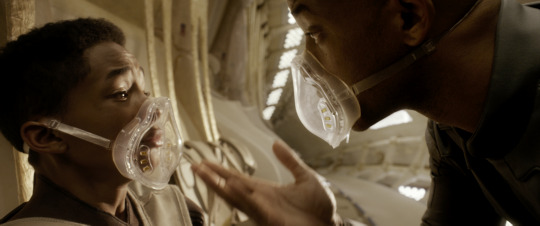
11. After Earth (2013)
They say always shoot for the moon, because even if you miss, you’ll land amongst the stars. With After Earth, M. Night Shyamalan showed that sometimes you can shoot for the moon, miss it and the stars, and land somewhere in the void. Lots of post-apocalyptic flourish and setup is used for what basically equates as a side-scrolling quest, and the choices made for the characterizations are so distracting in their oddness that it’s hard to invest yourself in the movie in any capacity other than a surface level dissection of the accent and dialogue. Shyamalan does have a knack for building lore in his films, but he does way more telling than showing in After Earth. If not for the ties to Will and Jaden Smith, this film could’ve sunk the Shyamalan ship.

10. Lady in the Water (2006)
I’m sure that M. Night Shyamalan had good intentions when he decided to turn a story he created for the enjoyment of his children into a feature-length film, but not every idea needs to be seen through into fruition. Many of the same issues that plague After Earth popped up in Lady in the Water, from the infinitely deep lore being smashed into exposition down to the extremely odd choices for characterizations, but unlike After Earth, at least there are recognizable aspects of the film that one can hang on to. There are a handful of surprisingly strong performances, given the ridiculousness of the content, but ultimately all other elements are shadowed by the sheer absurdity of the root narrative. I try not to pick on actors, but Bryce Dallas Howard just doesn’t do it for me in this flick.
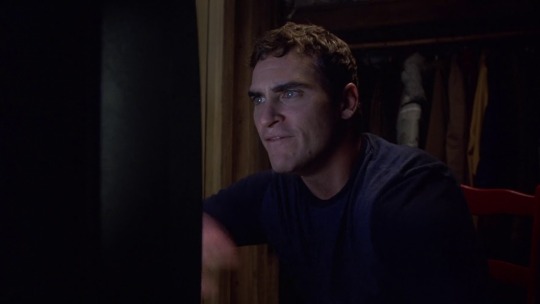
9. Signs (2002)
This is probably going to be the one that causes the most feedback in terms of position. According to the masses, this film is the true masterpiece in the M. Night Shyamalan canon, but as an aficionado of alien invasion films, Shyamalan seems to zig at every point he should have zagged. Mel Gibson and Joaquin Phoenix is an interesting coupling on paper, but if there is chemistry between the two of them as the film’s leads, it didn’t translate on screen. And for God’s sake, don’t even get me started on having aliens who are harmed by water choosing to come to a planet that, from space, is CLEARLY MOSTLY WATER.
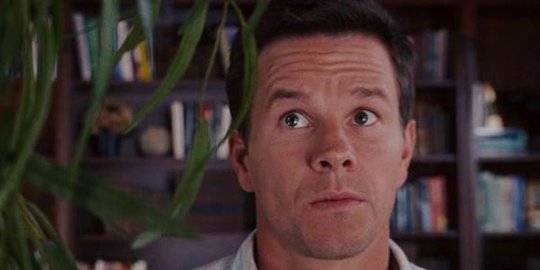
8. The Happening (2008)
While M. Night Shyamalan had presented “dumb” twists prior to The Happening (we’ll get back to that shortly), the sheer vastness of the revealed enemy creates a sort of inverse danger arc in regards to the journey we were presented… while there does seem to be destruction, and a sense of danger about what will happen next (and to whom) is built up, it pales in comparison when one realizes that nature is the enemy, and if this premise were true, the events seen more than likely would not have been so random in their scale, location and severity. Maybe I’m dumping a lot of speculation into this one, but when our male lead is doing what he does in most every film, and your female lead is given an uncharacteristically underwhelming performance, you get time to think about these kinds of things.
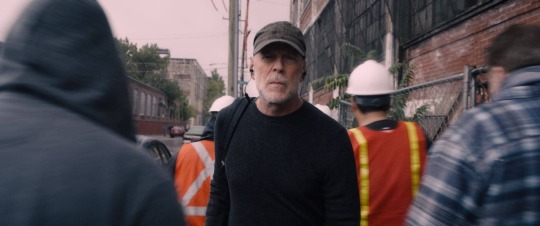
7. Glass (2019)
All of the potential in the world was there for Glass to be a mind-melter. What felt like the biggest, most elaborate twist in the entire M. Night Shyamalan universe had been revealed in the form of a secret trilogy that took nearly two decades to present itself, but sadly the landing was not stuck. All of the grandness of the world built in Unbreakable and Split suddenly felt much smaller and less elaborate when our characters essentially found themselves grounded, and while we were sold the idea that all of what happened was some sort of elaborate group hallucination, the feats pulled off by Crumb are still sold to us as reality, leaving the lines blurred much more than what was likely intended. We are even teased with a storyline that feels like mockery of what could have been, but in the end, Glass was the tragic landing that undercuts the brilliance that preceded it.
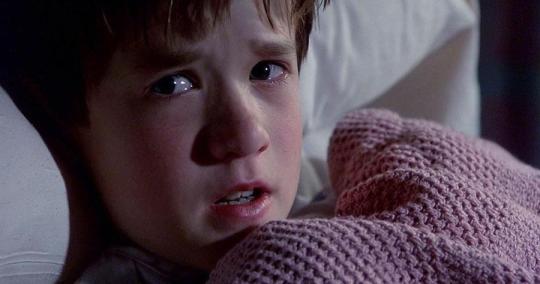
6. The Sixth Sense (1999)
This film is a tough one to place, because in terms of its technical prowess and execution, it is not only a brilliant film, but a stunningly impressive debut. The problem with this film, however, is the same that tends to plague even the best magic tricks… it’s amazing until the trick is revealed. In the case of The Sixth Sense, the first watch blows you away. The second watch, as a result, feels like a completely new movie, and is even more rewarding as it resolves itself once again. Any viewing after the second one, however, is plagued by a lack of surprise, intrigue or anticipation, and what we are left with is a good movie with no wow. Perhaps the best way to watch this film, at this point, is with someone who has never seen it and has somehow managed to avoid any spoilers, as it would be the closest one can get to experiencing this film with an uninformed eye.
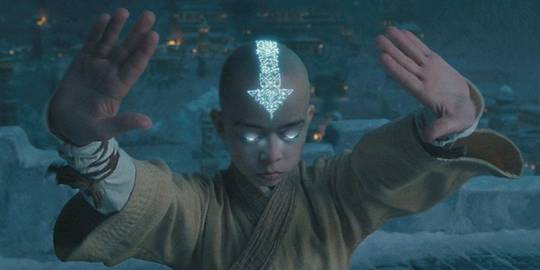
5. The Last Airbender (2010)
With a black cloud hanging over this film due to overwhelmingly negative backlash from fans of the Avatar animated series, I stayed away from it like one stays away from rotten garbage. Interestingly enough, I had no dog in the fight, as I had never seen any of the source material, and only had a layman’s understanding of it as a result, with no emotional ties to anything about it. I say that to say this… I can certainly understand how an adapted work can be met with brutal skepticism and aggressive analysis, and if even one stone of fan service is left unturned then the whole thing must be cast aside, but if taken on its own merits, this is a surprisingly strong film. It hits the bullseye in terms of being an epic kid’s tale in all the ways that Lady in the Water did not, and it has the big budget feel that was missing in Glass. Who knows... my thoughts on the film may change as I finally dive into the animated series, but as it currently stands, this film should be considered as a win in the Shyamalan collection.
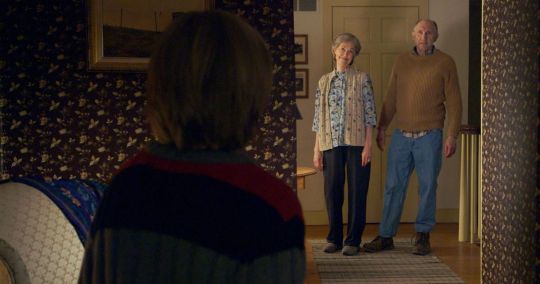
4. The Visit (2015)
What a truly bonkers movie. Watching M. Night Shyamalan’s take on the found footage film is surprisingly kinetic, and thanks to some of the best casting found in any of his films, we are given characters that evoke emotion and make us either care about them or fear them. There are probably even some who would claim that they “saw the twist coming”, and maybe I’m just a sucker, but when the curtain is pulled back on what’s really going on it feels like every loose string representing a question is suddenly pulled tight enough to choke. There are just enough games present in the writing that, while we question the crazier things we see, we can also shrug them off with “acceptable” answers. If you’ve managed to go this far without anyone spoiling the ending for The Visit for you, I highly recommend checking this one out immediately, as it is that vintage Shyamalan that many people are seeking out.
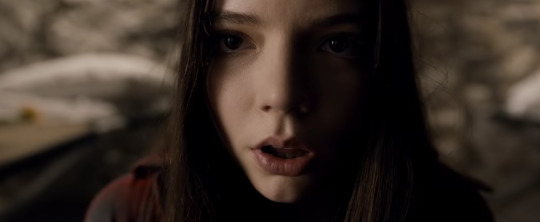
3. Split (2017)
If this one were just a one-off, it would probably still sit extremely high on the list of Shyamalan films. Anya Taylor-Joy is good in most everything she does, and James McAvoy is putting on a clinic in terms of range and character variety. The film gets about as broad as it can without going over the top, and that size is translated in the tension that emerges from the captivity that Kevin Wendell Crumb puts the girls in, forcing them to his live wire and ever changing personality. With much of the film boiling down to a few locations, and a freight train of a premise that is seemingly headed in one direction, it is natural to anticipate a Shyamalan swerve, but it’s the button at the end of the film that makes you realize the sheer existence of Split in itself is the twist. For that feat alone, this film must be applauded.

2. The Village (2004)
Remember when I brought up “dumb twists” earlier? I’ll be honest with you… this was the film I had in mind, despite it being my favorite (albeit it not my top ranked). Up until the moment of truth, everything presented in this film works : as a period film it is well-executed, the use of reds and yellows is iconic, the lore presented is actually shown and not left solely to exposition dumps, and Adrian Brody brings a performance level to his character that far exceeded what was necessary. I also tend to be hard on Bryce Dallas Howard, but she steps up to the plate when the story is shifted completely to her shoulders. The twist isn’t even actually all that bad, other than the fact that it may have been the most obvious premise for a twist, but I think that even a slight tweak in regards to the overarching location or the person who discovers Howard’s character would have greatly improved the execution of the twist moment. Even though M. Night Shyamalan had already made a great movie (which is coming up in just a moment), this was the one that brought me off the fence and into the camp that supports Shyamalan.
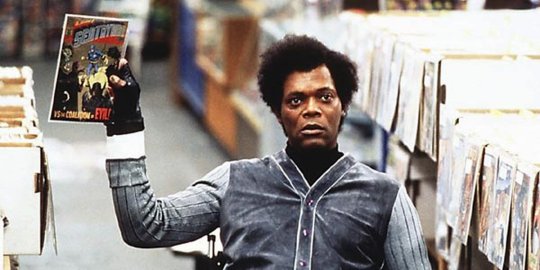
1. Unbreakable (2000)
It’s quite rare in the grand scheme of things to see a director make light year jumps in his second film, especially when their first film reaches phenomenon status. Somehow and someway, however, M. Night Shyamalan did the impossible by topping a film on the Mount Rushmore of debuts with the film that feels like the most ambitious and well executed of his career. A cursory search of the Bruce Willis filmography will show that outside of the first Sin City film and Looper, M. Night Shyamalan got the last of good acting he was giving directors. The visual interpretation of the comic book world framing is so nuanced and subtle that, upon learning the context and intention of the film, each repeat viewing brings new attention to these very layered visual details. The presentation of Elijah Price was so phenomenal that it ultimately caused expectations that crushed Glass upon arrival. Even if the Eastrail 177 Trilogy didn’t quite live up to expectations, there is no denying that Unbreakable was a pitch perfect table-setter, and an impressive film to boot.
#ChiefDoomsday#DOOMonFILM#MNightShyamalan#TheSixthSense#Unbreakable#Signs#TheVillage#LadyInTheWater#TheHappening#TheLastAirbender#Devil#AfterEarth#TheVisit#Split#Glass
0 notes
Note
What is your favourite thing about writing Ace? Do you have any headcanons regarding him that you've never posted?
What is your favourite thing about writing Ace?
I do not know what that would be! Overall I enjoy writing him regardless of the situation and my preferences are not so much about ‘what would be nice doing as him’ but ‘what I want to do regardless of it being with Ace or playing a potato’.
With that in mind, my favourite thing to write with him is the ‘deep’ plots. Ace is that beloved charismatic character who makes people laugh, who is a bit of a good… but any reader knows there is much below the surface and that is my favourite thing to dig out. It’s when I can truly explore him with my ideas and develop new one and it’s this thriving beehive of meta I love doing.
It’s a bit ‘draining’, which is why I welcome silly plots and memes but I would lie if I told you the sad stuff and the shit that goes on Ace’s mind is not my favourite part.
Do you have any headcanons regarding him that you’ve never posted?
I have plenty of ideas about Ace - you could say I’m prolific - but I don’t remember which ones I have posted and which I haven’t. And I have some of which I’ve unlifted the tip of the veil but have yet to write down, essay-like. They encompass many aspects of his life and even other verses, too!
So, not to make this answer a really lengthy one, I’m going to answer some ideas I have here and you - or anyone - is free to ask me to talk about them more in depth ok? (I do love that)
For some simple “favourites”, his favourite colour is orange (a bit in the face but also because of its energy); his favourite fruit is apple (drawn from that popularity spread & because they’re good pieces of fruit for him to take inside his backpack and snack on); and his favourite animals are fireflies and horses (for the former I wrote a piece around this idea and the latter is based on his ‘cowboy’ part of his design + he would appreciate the freedom in such a beautiful animal).
A stupid headcanon I have which doesn’t really mean anything is that Ace only uses his dagger for cutting said apples when he feels like eating them in slices. It’s a joke, but I would like to think about that dagger for, if Ace doesn’t really use it, it goes more in the ‘votive artefact’ category and thus deserves some good story behind it.
Ace is very tolerant to alcohol because he can feel the taste without feeling the burn, seeing as he’s made of fire.
Then I headcanon him as narcoleptic - for real, it being far more than a running gag - and though I have already talked about it in asks or given that expression through threads (again I don’t mind talking about this again, as I have yet to do a definitive text about it), there is an aspect I am finally including which is hallucinations. It’s not common for narcoleptic people to experience hallucinations, while it’s common for them to have cataplexy - based on his first Spice Bean panels I would discard this but the idea of Ace having hallucinations, though not often, makes sense to me, particularly if he is dreaming of Rouge or Sabo and thus, for a moment, sees them lingering for a bit next to him.
I’ve also talked about wanting to write about Ace and religion and still need to write it down but my idea is that in his early teenage years Ace tried to find answers in faith and that is how he ultimately learnt of St. Erasmus being the patron of sailors + his namesake phenomenon and much later decided to name one of his DF moves after him. However, Ace found no answers so he never embraced faith.
Had Ace survived the war, and after a while for resting and allowing Pops to rest as well should he survive too, a timeskip if you will, Ace would have travelled to the South Blue to visit Baterilla as he realizes he might have died without ever visting his birthplace. There, he finds Rouge’s old house and meets old neighbours of hers who talk to him of his mother and he finally discovers some things he imagined about her as a kid. (I like this idea so much I am plotting it with theoceanslibrarian after the main thread we’re currently doing)
Speaking of her, I headcanon that there was a period when, as a child, Ace blamed himself for her death based on the evidence he’s alive and she’s not. This leads him into having nightmares where he is responsible for her death much more vividly or good dreams, sad dreams of the two of them together which leave him in tears. While I am placing the start of his narcolepsy in his early teens, the two things couldn’t help being connected as narcolepsy is a long term disorder about sleeping, as you know.
I also headcanon that his dislike for cry-babies as he tells Luffy comes from Ace seeing children his age get hurt, crying and having their parents arms around them, telling them it’s ok - which is something he never had. Thus, seeing children cry in such a way irritates him, anger being a better emotion to display as part of the tough kid role than sadness.
And while there are jokes about his necklace looking like Dadan’s... I say it is Dadan’s! She keeps more than one and Ace stole it before setting out to see - even though we don’t see him wearing it when he says goodbye to Luffy. Ace acknowledges the two mothers he has, Rouge and Dadan, and thus sports the latter’s necklace as a secret homage to her at the same time he takes the Portgas surname as a not-so-subtle tribute too.
I also headcanon that, in the OP chronology proper, Ace’s (and Whitebeard’s) graves became a pilgrimage place for rookies who, regardless of their thoughts on Roger, see him as a symbol for all pirates, just as the war was by showing the most extreme side of marines versus pirates and what ‘justice’ might mean. I am not saying this would happen in a couple of years and I am not saying it would be a compulsory thing, yet, it might happen a generation later or so, with kids who never knew of Roger and Ace but heard stories of the war and decided to pay their respects. Of course the graves shouldn’t be located somewhere for everyone to access, so we’re not talking of hundreds of pilgrims. Ace’s belongings would have been kept in good condition and some other items might be deposited by his tombstone.
I have more but this is already ‘gospel lenghty’ as is.
#long post for ts#[i try not to write much and i do]#✕ set the world on fire [answer]#chxpper#[thanks for sending! <3]#✕ [headcanon]
2 notes
·
View notes